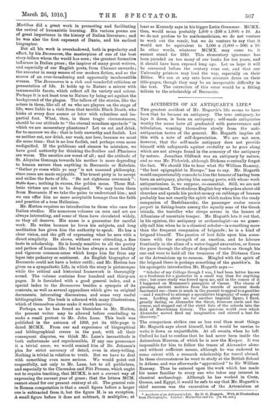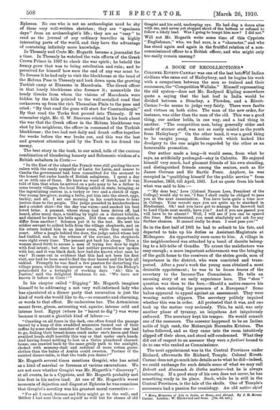ACCIDENTS OF AN ANTIQUARY'S LIFE.*
THE greatest accident of Mr. Hogarth's life seems to have been that he became an antiquary. The true antiquary, he lays it down, is born an antiquary ; self-made antiquaries worthy the name have all graduated with perseverance and
tribulation, weaning themselves slowly from the anti- antiquarian tastes of the general. Mr. Hogarth implies all this with a note of self-depreciation. We are not sure, however, that the self-made antiquary does not provide himself with safeguards against credulity as he goes along which are not always found in the armoury of the antiquary by nature. Jonathan Oldbuck was an antiquary by nature, and so was Mr. Pickwick, although Dickens eventually forgot the fact. We should like to hear what Sir William Ramsay, "the best epigraphist in Europe," has to say. Mr. Hogarth would unquestionably concede to him the honour of having been born an antiquary, placing him among poets, with whose work antiquarianism is, we suppose, co-essential. Still, we are not quite convinced. The studious English boy who pokes about old churches and spends his pocket-money on rubbings of brasses probably has not exactly the spirit which makes him the ready
companion of Bashibazouks, the passenger auclaz crmnia perpeti in fishing-boats among the squally seas of the Greek islands, the traveller who sleeps serene in the houses of
Albanians of uncertain temper. Mr. Hogarth lets it out that, in his opinion, the antiquary or archaeologist—as we gener- ally call him when he is a classical scholar—is something more than the frequent companion of brigands ; he is a kind of brigand himself. The passion of loot falls upon him some- times with the strength of an emotion, and he labours frantically in the slime of a water-logged excavation, or forces the pace through the alleys of despoiled tombs as though his one end were to hold all the treasures of the Dietaea.n Cave or the Artemisium up to ransom. Mingled with the spirit of the brigand there is perhaps something of the gambler's. In his apologetic introduction Mr. Hogarth says :—
"Scholar of my College though I was, I had been better known as a freshman for a gamester in a small way than for anything else ; but some study was forced upon me, and in the course of it I happened on Mommsen's panegyric of Caesar. The charm of guessing ancient motives from the records of ancient deeds fascinated me—there is much in the pursuit to appeal to a gambler —and I resolved to attempt a speculative biography of some great man. Looking about me for another imperial figure, I fixed, greatly daring, on Alexander the Great, forswore cards and the course, and stepped out of the strict lists of the schools into the field of Macedonian history. The spacious world over which Alexander moved fired my imagination and stirred a lust for discovery."
The comparison strikes one as less real than most things Mr. Hogarth says about himself, but it would be unwise to write it down as unjustifiable. At all events, when he left
Oxford he had to confess that he had never been inside the Ashmolean Museum, of which he is now the Keeper. It was impossible for him to follow the traces of Alexander alone and without sufficient means, although be was endowed to
some extent with a research scholarship for travel abroad. In these circumstances he went to study at the British School in Athens, and was afterwards " apprenticed " to Sir William Ramsay. Thus he entered upon the work which has made his name familiar to every one who takes any interest in classical archaeology. Although he has worked in Crete, Greece, and Egypt, it would be safe to say that Mr. Hogarth's chief success was the excavation of the Artemisium at
* Accidents of an Antiquary's Life. By D. G. Hogarth. With 40 Illustrations from Photographs. London ; Macmillan and Co. [7s. 6d. net.] Ephesus. No one who is not an archaeologist need be shy of these very well-written sketches ; they are "specimen days" from an archaeologist's life ; they are as "easy" to read as the journal of any ordinary traveller in highly interesting parts of the world, and they have the advantage of containing infinitely more knowledge.
In Thessaly and Crete Mr. Hogarth became a journalist for a time. In Thessaly he watched the vain efforts of the Greek Crown Prince in 1897 to check the war spirit ; he beheld the frenzy grow that was to bring retribution and ruin ; and he perceived for himself how sure the end of any war must be. To foresee it he had only to visit the blockhouse at the head of the Meluna Pass in Thessaly and look down upon the growing Turkish camp at Elassona in Macedonia. The Greek officer in that lonely blockhouse also foresaw it ; meanwhile the heady Greeks from whom the visions of Macedonia were hidden by the hills pointed to the well-metalled road that corkscrews up from the rich Thessalian Plain to the pass and cried : "By that road the guns will start for Constantinople." By that road the Turks first poured into Thessaly. If we remember right, Mr. G. W. Steevens related in his book about the war that the Greek officer in the Meluna blockhouse was shot by his neighbour, the officer in command of the Turkish
blockhouse ; the two had met daily and drunk coffee together for weeks before the war broke out, and this was the last and greatest attention paid by the Turk to his friend the enemy.
The best story in the book, to our mind, tells of the curious combination of blundering honesty and Solomonic wisdom of a British subaltern in Crete :—
" In the East of the island the French were still guiding the new rulers with the ready sympathy of Latin for Latin, and nearer to Claudia the government had been committed for the moment to the honest but ruder hands of British subalterns. I spent a day or so with one of these. He knew no word of Greek, and it was told of him that when he arrived on a polo pony to be a father to some twenty villages, the local Bishop called in state, bringing, as the ingratiating custom is, a turkey or two and a clutch of eggs. Our young law-giver, nosing a bribe, put him into the street, eggs, turkey, and all. I sat one morning in his court-house to hear justice done to the people. The judge presided in knickerbockers and a cricket shirt—for the day was warm—and smoked his best loved briar. A peasant, whose sheep had been driven off, had heard, after many days, a tinkling by night on a distant hillside, and claimed he knew his bells again. Did then one sheep-bell so differ from another? Solomon put it to the test. He sent his soldier servant to collect bells from the village shepherds, and on his return locked him in an inner room, while they waited in court. After a jangle behind the door, the judge asked whose bell had tinkled, and, on the witness of the servant, the shepherds were right every time. The peasant got back his sheep. Then a woman stood forth to accuse a man of trying her door by night with foul intent ; but since he had neither prevailed nor spoken with her, and it was black dark, how had she known what man he was ? It came out in evidence that this had not been his first visit, nor had he been used to find the door barred and the lady all -unkind. Promptly he was fined a few piastres for disturbing the village peace, while the coy accuser was sent to hoe the Bishop's
potato-field for a fortnight of working days. Ah ! this is Justice,' said the delighted Headman to me. 'We have not known it before in Crete !' "
In his chapter called " Digging " Mr. Hogarth imagines himself to be addressing a not very well-informed lady who has ejaculated at a dinner party that excavation is just the kind of work she would like to do,—so romantic and charming,
or words to that effect. He undeceives her. The Artemisium meant fever, gloom, saturating wet, squalor, intense cold and intense heat. Egypt (where he "learnt to dig ") was worse because it meant a ghoulish kind of labour :— " Crawling on all fours in the dark, one often found the passage barred by a heap of dim swaddled mummies turned out of their coffins by some earlier snatcher of bodies ; and over these one had to go, feeling their breast-bones crack under one's knees and their swathed heads shift horribly this way or that under one's hands. And having found nothing to loot in a thrice plundered charnel- house, one crawled back by the same grisly path to the sunlight, choked with mummy-dust and redolent of more rotten grave- clothes than the balms of Arabia could sweeten. Partner of the scented dinner-table, is that the trade you desire ?"
Mr. Hogarth several times mentions GregOri, who has acted as a kind of marshal or foreman at various excavations. We are not sure whether GregOri was Mr. Hogarth's "discovery"; at all events, he is a Cypriote, and Mr. Hogarth probably met him first in his native land. At one of Mr. Hogarth's worst moments of dejection and disgust at Ephesus he was conscious that Gregdri's scrutiny was his greatest moral corrective :—
"For all I cared, Science and Duty might go to the wall; and thither I had sent them and myself as well but for shame of old Greg6ri and his cold, unsleeping eye. He had dug a dozen sites with me, and never yet stopped short of the bottom or refused to follow a likely lead. Was I going to tempt him now? I did not."
Will not Mr. Hogarth write some time of this Cypriote "Englishman," who, we feel sure, is a "character," and who
has stood again and again in the fruitful relation of a non- commissioned officer to a British officer, and who might only too easily remain unsung?







































 Previous page
Previous page